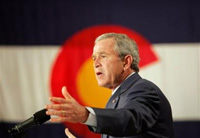
US President George W. Bush confronted doubts about his war policy Wednesday, saying it's still uncertain when US forces can be withdrawn.
"No war has ever been won on a timetable," according to a new White House strategy document.
Facing criticism and impatience about the conflict, Bush went on the offensive with the release of a 35-page plan titled "Our National Strategy for Victory in Iraq."
The plan says increasing numbers of Iraqi troops have been equipped and trained, Iraq's economy is being rebuilt and US military and civilian presence will change as conditions improve.
"We expect, but cannot guarantee that our force posture will change over the next year, as the political process advances and Iraqi security forces grow and gain experience," the report said.
"While our military presence may become less visible, it will remain lethal and decisive, able to confront the enemy wherever it may organize."
Along with the report, Bush made a personal appeal to shore up wavering support for the war in remarks Wednesday at the US Naval Academy. It was the first in a series of speeches Bush was to deliver between now and the December 15 election in Iraq to outline political, security and economic strategies for Iraq.
Bush's speech did not break new ground or present a new strategy. Instead, it was intended to bring together in one place the administration's arguments for the war and its strategy on a military, economic and political track.
Bush's emphasis on the readiness of Iraqi security forces came at a time when continued violence in Iraq and the death of more than 2,000 US troops have contributed to a sharp drop in Bush's popularity.
Sixty-two percent of Americans, in an AP-Ipsos poll taken in November, said they disapproved of Bush's Iraq policy. Thirty-seven percent approved of his policy down from 43 percent in May. The president's overall job approval rating is at 37 percent, the lowest level of his presidency.
Senator Russ Feingold, a Wisconsin Democrat, said on Tuesday that the president should have proposed a plan months ago that includes a flexible timetable, tied to clear benchmarks, for concluding the US military mission in Iraq.
"The American people deserve a clear plan for concluding our military mission," said Feingold.
There are about 160,000 US troops in Iraq. The Pentagon has not committed to any specific drawdown of US forces next year beyond the announced plan to pull back 28,000 troops that were added this fall for extra security during the election.
White House spokesman Scott McClellan joined other top administration officials on Tuesday in raising expectations that Washington could reduce the number of troops next year. Secretary of State Condoleezza Rice said last week that the United States may not need the number of troops it has in Iraq "all that much longer."
(China Daily via agencies December 1, 2005)
|

